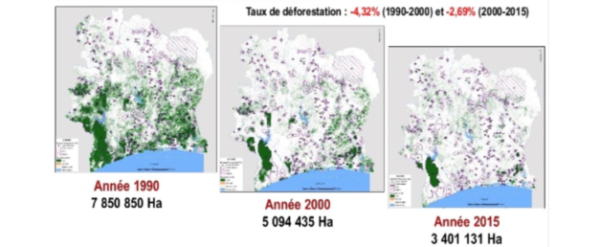Maintaining accelerated growth but above all ensuring that it is sustainable over time in a context of climate change, this is the challenge facing Côte d’Ivoire according to the latest World Bank country report presented this July 12 . The country runs the risk of compromising its economic progress and tipping millions of its citizens into poverty, if it does not provide an adequate response, alert the report entitled “To ensure that tomorrow will never die: the Coast d’Ivoire in the face of climate change “.
The country is indeed exposed to the climatic disturbance all the more since it has been trying to destroy its forest resources. “Estimated at 37% of national territory in 1960, the forest cover was reduced to less than 14% in 2010 (…). This rate of deforestation is one of the fastest in the world, “says the World Bank.
As a result, “the value of the natural capital stock per capita decreased by 26% between 1990 and 2014”, a “worrying” situation whose expected economic effects are disastrous.
“This report is a wake-up call to raise awareness quickly and collectively (…). The fight against climate change will require immediate decisions and must become a priority for the country to maintain an accelerated and sustainable pace of growth in the long term “urges Pierre Laporte, director of operations of the World Bank for Côte d’Ivoire. ‘ ”
A “dramatic” scenario
According to the report, part of the south of the Ivory Coast, a traditional cocoa production area, will become unfit for this crop as a result of “the increase in temperature that risks making the land more arid and less fertile” and this as early as 2050, in a little over 30 years. A direct threat to the economy with an impact on the millions of people dependent on cocoa revenues.
Also, Côte d’Ivoire’s 566 km long coastline, which “produces close to 80 percent of national GDP,” is an area at risk: “two-thirds of this coastline is affected by coastal erosion, with dramatic consequences for the communities and the region. ‘economy of the country’ notes the World Bank.
Côte d’Ivoire, which has completed 2017 with growth of nearly 8%, should continue its momentum with an increase in GDP “in the order of 7 to 7.5% over the next few years”. And the country, a priori aware of the threat of deforestation, announced last May 26 a ten-year investment plan of CFAF 616 billion, or about 940 million euros, intended for “preservation, rehabilitation and rehabilitation. extension “of its forest cover.



